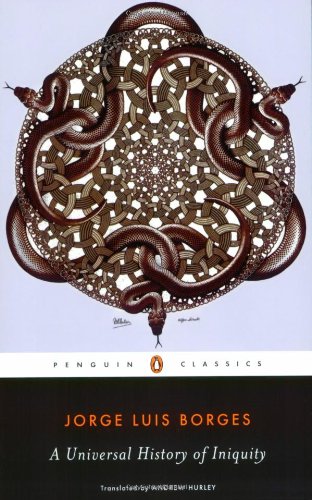A Universal History of Iniquity by Jorge Luis Borges
Jorge Luis Borges, A Universal History of Iniquity. Penguin Classics, 2004. Translator: Andrew Hurley.
A long time ago a good friend of mine recommend Borges to me. At the time I read Fictions and quite enjoyed his short stories. I remember them being strange, thought-provoking, and genre bending. Somehow I never gave Borges another thought. Never, that is, until I came across this book and, stirred by the distant association of the name "Borges" with enjoyable reading, started reading. I was not disappointed.
This is Borges first book and it is a kind of non-fiction. I am fairly certain the stories are embellished, but this only makes them better. What you have here are short stories from the old west, medieval Islam, ancient Asia, and more, each focused on the highly colorful life of one individual. These stories are crafted with genius and very enjoyable to read.
Borges is a master writer. I regularly sat back from reading this book just to marvel. I used the word crafted above because that is the sense I got in reading: that I was holding the highly polished result of long hours of careful crafting. His words become images and dance in the mind. His biting wit, displayed as it is in such tragic tales, drew me through each page with delight and horror.
My two favorite stories were "The Cruel Redeemer Lazarus Morell", which tells of Morrel's many crimes in the American south during the time of slavery, and "The Uncivil Teacher of Court Etiquette Kotsuke no Suke", which is a sparse retelling of the tale of the 47 Ronin.
Conclusion: 5 Stars. It should be obvious, but I highly recommend this book.

Comments
In his preface to the 1954 edition, Borges distanced himself somewhat from the book, which he gave as an example of the baroque, “when art flaunts and squanders its resources”; he wrote that the stories are “the irresponsible sport of a shy sort of man who could not bring himself to write short stories, and so amused himself by changing and distorting (sometimes without aesthetic justification) the stories of other men”.
Roger Hui